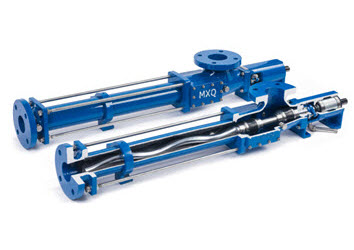Crude oil processing is carried out in an oil refinery. In this industrial process, crude oil is transformed into refined oil, which is used to make many daily useful products such as liquid petroleum gas (LPG), diesel, gasoline, and so on. They also produce liquids used to manufacture a variety of plastics and chemicals. The infrastructure in a refinery is huge and complex. They have huge, sprawling premises with a meshwork of pipelines. For this the pumps, motors, and the related equipment used need to be robust and resistant to abrasive chemicals, slurries, oil impurities, and semi-solid fluids. Progressive cavity pumps are widely used to transfer such difficult fluids in this industry. This is because they are capable of transferring some of the harshest fluids without causing any damage. This post discusses the crude oil refining process and the use of pumping systems in the same.
How is Crude Oil Processed?
Crude oil is a dark and unusable sticky fluid mixture of hydrocarbons, which needs refining to turn into a useful commodity. Here are the steps which show the processing of crude oil into a refined usable liquid:
- Crude oil is heated until the boiling point.
- A distiller is used to separate the boiling fluid from gases and other liquids.
- These liquids are used to make automotive fuels such as petrol and diesel.
- The distiller is hottest at the bottom. In the distiller column, the gases, by their nature, traverse upwards and eventually cool down.
- After cooling, they condense and regain liquid form.
- These liquids undergo further refining to make them more useful. The heavy liquids are processed to become light because the demand for the latter is more.
- There are many processes such as catalytic cracking used to convert heavy fluids into light ones.
Progressive cavity pumps are used to transfer this crude oil to storage vessels or automotive such as rail cars or trucks.
Progressive Cavity Pumps as Oil Transfer Pumps
Progressive cavity pumps (PC pumps) have been used for oil transfer over the last few years because of a number of benefits they offer, such as surface transfer pumping. Initially, they were used for surface transfer of oilfield fluids. Over the last few years, they have been used for artificial lifting in the oil & gas industry. This technique is used for oil wells to improve their production rate by lowering the bottom-hole pressure (BHP). PC downhole pumps are used here because they help lower the flowing pressure. There are other types of artificial lift systems as well, such as sucker-rod pumping. However, the right type can be selected on the basis of the location, application, required output, cost, and other factors.
What are the Benefits of Using PC Pumps for Oil Transfer in Refineries?
Oils have greatly varying properties such as viscosities, the quantity extracted at the well site, the hydrocarbon structure; depending upon the geographical location. So, the pumping systems need to be highly sturdy and customizable. Here are some of the benefits of using PC pumps to transfer crude oil:
- Progressive cavity pumps can be customized to work at the required temperature and pressure.
- They have a robust design and can withstand harsh work environments such as in oil refineries.
- They ensure a smooth flow of oil without pulsation and minimal vibration.
- They are designed to handle various types of fluids and gases including slurries, semi-solids, viscous, abrasive chemicals, and so on.
Pumping systems are a crucial part of the oil & gas industry and it is mandatory that they meet the required regulatory standards. If you are looking for a good-quality PC pump, along with the installation services, ensure you approach a reputed manufacturer and supplier. MXQ has a variety of progressive cavity pumps and spare parts, and more than 20 years of experience in offering end-to-end services for fluid handling systems. This includes everything from packaging and installation to maintenance and replacements.


